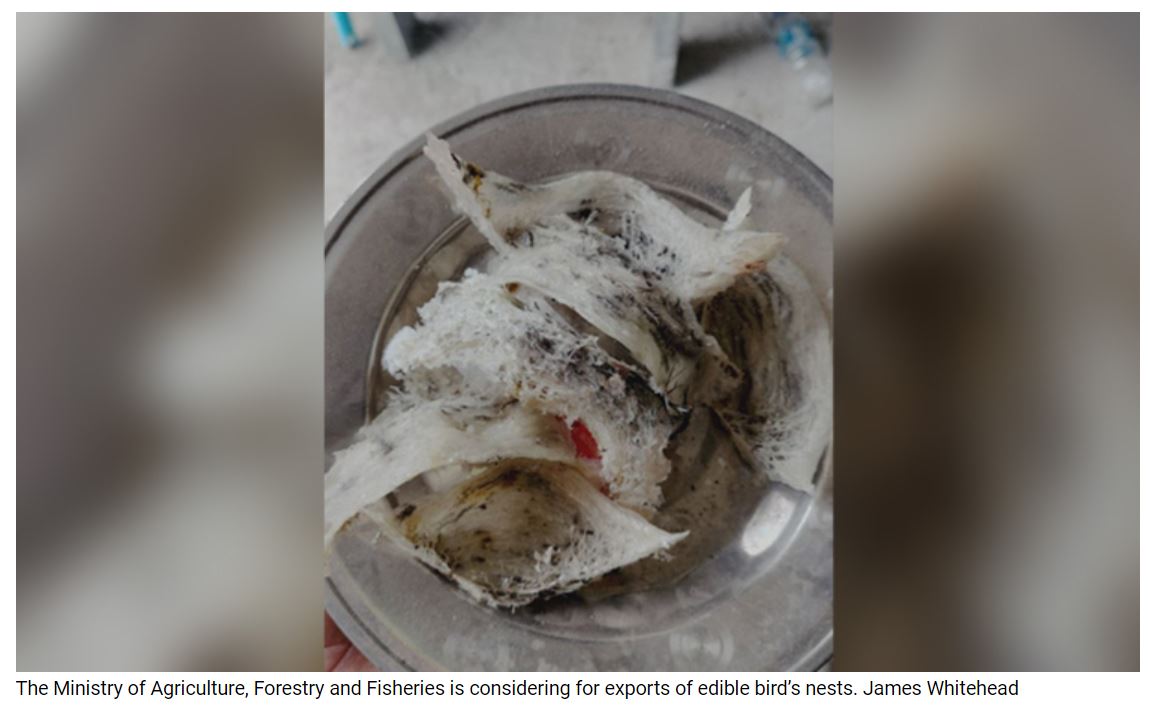Cambodia: Local bird’s nest market returns for farmers strong in 2023
Over recent years, several steps have been taken by the state and private sector to bolster the supply of Cambodian bird’s nests for export demand to neighbouring markets such as China and Singapore. The spirited saliva can fetch over $2,000 per kg in overseas markets.
The year 2023 marked a clear step forward in this policy for Cambodia with announcements of joint standards signed in Beijing.
Edible bird’s nest is most known for its healing qualities in traditional Chinese medicine. Yet the notion has travelled throughout the broader Asian continent along with many other facets of ancient Chinese society.
The trend may be moving globally also, as the product is already catching high prices in some western markets servicing local Asian populations, and new converts.
The dried saliva of the white-nest swiftlet (Aerodramus fuciphagus) is consumed for its real or perceived health and well-being benefits. The birds are plentiful across rural and some parts of semi-urban Southeast Asia.
The nests are processed to remove any debris from the saliva and combined with rock sugar to make a “bird’s nest soup”, among other slippery, sweet and medicinal treats.
The Ministry of Agriculture, Forestry and Fisheries last year formed a technical working group to negotiate the opening of the market for exports of edible bird’s nests to China, and other potential partners.
The Khmer Swiftlet Association (“KSA”) was also recognized by the Government as an official platform to support development of the local edible bird’s nest ecosystem, and bolster exports, formed in March 2022.
In March of this year, Cambodia, China, Malaysia, and Indonesia mutually announced an agreement to initiate a joint standard for bird’s nest for the Chinese market, aiming to build confidence among customers and boost exports for member states after talks together in Beijing.
To get a feel for the state of the sector domestically in 2023, Khmer Times reached out to a local bird’s nest farmer in Prey Veng Province, Rithy.
Rithy is a novice swiftlet farmer, approaching the end of his second year of operation.
“Sale prices for the nest in Cambodia in 2022 were better for small farmers than they are in 2023,” said Rithy.
Rithy operates on a bird nest farm on his Prey Veng land, the house measures 8 by 16 meters, with two high floors with small entry points for birds to make short or long-term stays.
Rithy commented however that it could be a smaller or bigger house, depending on the farmer’s budget, which makes it flexible for small business people to grow the business.
Of course, the bigger the house dimensions, the more bird apartment units available for boarders.
“While the business can feasibly be done anywhere in Cambodia given you have land, a house and the know-how, the best spots are those that resemble a waterfront area or an area with a lot of rice fields because these places are richest in animal feed for the birds,” explained 35-year-old Rithy.
This year, he said, “the nest sells for $500 to $600 per kilogram in its uncleaned and unprocessed form.”
But for processed product, prices are much higher, said Rithy: “Grade A: 1 gram sells from $150 to $160. Grade B: 1g from $130 to $140. Grade C: 1g from $110$ to $120.”
However, while Rithy is aware of the recent Association for direct export to China, he has not yet joined because the nests he collects from his farm are still too small for bulk export orders. Instead, he sells to resellers in Phnom Penh.
The KSA president, Suy Kokthean, was quoted in March 2022, explaining the state of the local bird’s nest market at that time.
Kokthean said that annual production in Cambodia is likely less than 100 tonnes in total, even though environmental conditions are good for the business.
Kokthean said that uncleaned bird’s nests ranged between $650-$700 per kg in Cambodia as of March 2022.
Cleaned ones locally go for between $1,600 and over $2,000.
Yet he noted that in Malaysia the same product can fetch $800-$1,000 per kg.
Nang Sothy, Cambodia Bird’s Nest Federation president, said that uncleaned edible bird’s nests would go for $480-$750 per kg during the same period. Cleaned product in the $1,500-$3,500 range, depending on grade, he said.
Regardless of the decrease in returns this year, Rithy remains satisfied with the business venture, after just a year and a half of starting the farm.
He had no regrets and may expand his operations in future, he said.
“Because I don’t need to spend a lot of time caring for the birds,” said Rithy, “I just open the bird sounds on the loudspeaker to attract them, and visit every two weeks to check inside, in case there are any insects that could affect them.”
“It’s fairly simple and a low-time commitment. I can collect 0.5 kg every 3 weeks already,” Rithy said.
And his returns will increase soon too. As it is normal for young swiftlet houses like his to produce only 0.5 kg per harvest. “When my house is older than 2 years,” Rithy explained, “I will collect more than 1 kg every two weeks.”
Meaning a potential income of $1000 per month for essentially taking care of wild birds.
Source: https://www.khmertimeskh.com/501319004/local-birds-nest-market-returns-for-farmers-strong-in-2023/


 Thailand
Thailand




